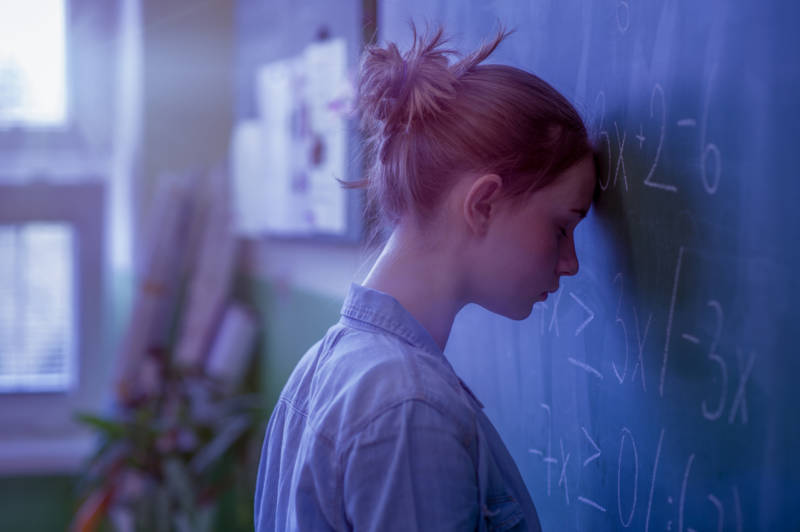Teachers and parents all over the country are noticing an increase in mental health issues, including anxiety, among students.
As Students Struggle With Anxiety, a California School Tries to Help

In 2004, the National Institute of Mental Health estimated that about a third of adolescents (ages 13-18) have been or will be seriously affected by anxiety in their lifetimes. More recently, a study published in the Journal of Developmental and Behavioral Pediatrics concluded that more than one in twenty U.S. children (ages 6-17) had anxiety or depression in 2011-2012. And a UCLA survey of college freshman conducted each year, found in 2017 that close to 39 percent frequently felt “overwhelmed by all I had to do.”
Parents and educators are scrambling to understand why kids seem to be more anxious and how to help them.
This week, The California Report Magazine welcomes Katrina Schwartz to share findings from her recent time spent reporting on student anxiety for the MindShift podcast.
Sasha Khokha: Why did you guys decide to focus on anxiety?
Katrina Schwartz: This season we asked our audience what they were interested in and what mattered most to them, and anxiety kept coming up over and over. Teachers and parents are genuinely confused about why so many kids are struggling with anxiety. They want some tips on how to deal with it. It seems like the problem is growing.
SK: I’m married to someone who’s a teacher, who comes home all the time with stories about how anxious high school kids seem to be these days. Do we know why anxiety seems to be such a problem for kids?
KS: It’s really hard to say. Adults love to blame it on social media – and I’m sure that that does play a role – but it’s worth noting that there are all kinds of reasons that kids experience anxiety no matter what socio-economic situation they come from.
SK: So whether it’s violence in the home, or struggling to have enough food to eat, or AP tests or stress about college applications?
KS: Yeah, totally. One thing we do know is that anxiety is way more debilitating than just plain old stress. It’s actually a condition that can get in the way of relationships and stuff like work and school.
SK: This high school you visited for your story, El Cerrito High School, it sounds like they actually have a lot of resources to help students dealing with anxiety?
KS: They have this center called the James Morehouse Project. It’s their wellness center. They’ve been trying to look at the problem holistically and support students with all kinds of problems. One way they’re able to do that, is they host a clinical social work internship program, which gives them a lot more adults in the building to be doing therapy, and running groups.
SK: So what are some specific things they’re doing to help kids with anxiety?
KS: There’s some big macro things. Stuff like giving kids more time between classes, so it’s a little less frenetic, or changing up the way the schedule works, so kids are on a block schedule and only have four classes instead of seven. But then, at a more specific level, they’re doing things like running these anxiety groups where they’re giving students specific strategies to cope with their own anxiety.
SK: Is mindfulness part of it? I know that’s a big push now in schools these days.
KS: Yeah. With anxiety there’s this bodily response, this physical response, and then there’s what’s going on in your head. So the mindfulness stuff really helps ground students, get them to calm down, so then they can challenge their thoughts. Many students describe [anxiety] as overthinking or negative thinking. Social workers are trying to get them to tell themselves a different story about what’s going on.
SK: What can parents do to help kids who are dealing with anxiety?
KS: The first one is kind of obvious, but hard to do — try not to put a ton of pressure on your kids. They’re probably already feeling it, so don’t add to it. If they are struggling, don’t be judgmental. I think a lot of times parents see the behaviors that come from anxiety, like procrastination or not doing their work, and they jump in and get on a kid’s case without stopping to think, “Where is this coming from?” And if you can approach it with a little more curiosity and ask your kid whats going on, they might be more willing to share what’s at the root of the problem.
SK: So back off. Easier said than done!
KS: If you do that work up front you can do the hardest part, which is helping kids face their anxiety. It’s trying to control them. Sometimes the role of the parents is to push back against the anxiety and ask kids to face it.
Hear the stories of two students working through their problems with anxiety by pressing play at the top of this page. Or, read the full web story from MindShift, “How Can Schools Help Kids With Anxiety?” You can also subscribe MindShift on Apple Podcasts, NPR One, or wherever you get your podcasts.
